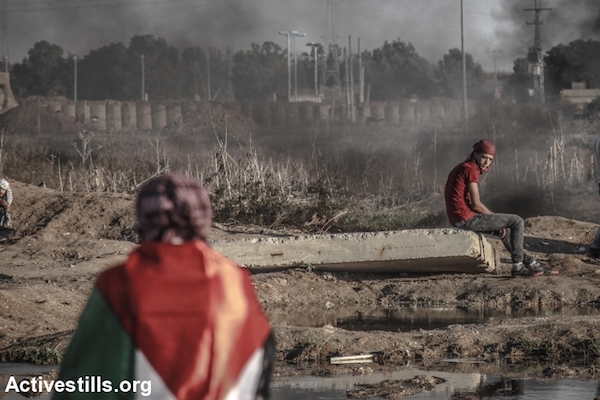The Americans are disengaging from the conflict, the EU won’t go beyond half-measures, and the Palestinian Authority is on the verge of implosion. So what happens next?

In meetings between top-ranking Israeli and American officials over the past few weeks, the United States reportedly demanded that Benjamin Netanyahu outline steps he is willing to take to ensure the window for a two-state solution doesn’t slam shut. Netanyahu’s answer has more or less been: nothing.
Asked to make goodwill or humanitarian gestures to the Palestinians to keep a two-state vision alive, Netanyahu reportedly conditioned any step on the United States endorsing Israel’s “right” to build settlements in the occupied West Bank. “Umm, no,” Washington replied for a plethora of obvious reasons.
The current Israeli government, of course, has no desire or intention to advance the two-state solution. A sizeable and powerful bloc of ministers and coalition members do not support the two-state solution even in theory. Instead they advocate various iterations and variations of annexation, a one-state solution reminiscing apartheid, and an if-it-ain’t-broken strategy that would cement the current status quo into a permanent solution.
Netanyahu belongs to the preserve-the-status-quo group. And so, faced with ISIS and Russia and domestic terrorism and a legacy to package, the White House will likely stay away from the conflict unless another full-fledged war breaks out.
Make no mistake: American disengagement is Netanyahu’s best-case scenario — second only to a fantasy scenario in which the White House recognizes Israel’s right to annex whatever parts of the West Bank it pleases while leaving as many Palestinians as possible with no civil rights or citizenship. As far as the Netanyahu government is concerned, American diplomatic disengagement gives him and his government a free hand to continue entrenching Israeli military control over the Palestinian people and territories, until there truly is no other reality to discuss.
European half-measures

Some Palestinian advocates and sympathizers in recent years have invested more and more hope into the prospect of Europe applying increasing pressure on Israel. The implementation of settlement labels, therefore, was promising, or at least exciting, for those whose hopes lie in Brussels.
But Europe did not fire off the long-awaited labeling regime as a warning shot or the first in a series of steps designed to pressure Israel on the occupation or even the settlements. Instead, the EU played down the announcement as a technical, consumer protection measure that shouldn’t worry anybody.
Instead of worrying decision-makers in Jerusalem, Brussels’s stutter-step caused Israel to double down by asking the U.S. to recognize those same settlements as legitimate, openly stating its intentions to expand those settlements, and even leaking the ludicrous story about suing Europe in the WTO.
The lesson to be drawn from these two interactions, with Washington and Brussels, is that the current Israeli government does not see advancing a two-state solution as being in its own interest, and that symbolic acts of pressure will only make Israel’s hawkish government more intransigent.
If external pressure is ever to have the desired effect on Israel’s willingness to make the requisite compromises for peace with the Palestinians, regardless of the number of resultant states desired, it will require more than micro-irritations like settlement labels. Europe simply does not have the political will or the diplomatic unity to accomplish that at the moment.
The illusory State of Palestine

People on both sides of the Green Line are once again talking about the eventual — or imminent — collapse of the Palestinian Authority, or the State of Palestine, as it renamed itself a couple of years ago.
It is important to remember that the Palestinian Authority was born out of the Palestinian Liberation Organization as a temporary, Oslo-era institution meant to administer newly autonomous areas of the West Bank and Gaza while the PLO and Israel hammered out the final details of a peace deal.
The Palestinian Authority declared the birth of the State of Palestine not as a sign of moving to the next stage in Palestinian liberation, but as an act of diplomatic protest. Frustrated by the diplomatic zombie we’ve come to call the peace process, the Palestinian leadership tried adopting an Israeli tactic, facts on the ground, and simply declared statehood where there was none.
Considering the PA’s reborn raison d’être as Israel’s security contractor, it is easy to forget that the PLO is a national liberation organization whose goal is the liberation of Palestine, or at least large swathes of it. It is far harder to forget that no state of Palestine was ever really established on the ground, and a national liberation organization that declares an imagined victory cannot hold onto its mandate to rule for very long.
Tyranny of the majority
The Israeli cabinet reportedly held marathon discussions this week about the possibility of the Palestinian Authority’s collapse, either as a result of its waning legitimacy, Israeli military pressure or compounding economic crisis. Some members of the security cabinet’s response was “good riddance,” according to several officials who spoke to Haaretz’s Barak Ravid.
It should be clear at this point that nobody is coming to end the occupation — neither on behalf of the Israelis nor the Palestinians. The current diplomatic framework has failed. Violent struggle has failed. The UN track hasn’t changed a single thing on the ground, only the letterhead in Ramallah.
And so without any fanfare or headlines, the status quo lives to see another day. And that is a choice. It is not the right of Israelis to democratically make that choice — to perpetuate the occupation, the apartheid legal system, and the deliberate and systemic denial of civil, human and national rights to millions of Palestinians. And yet, Benjamin Netanyahu, the democratically elected leader of Israel, wakes up and makes that decision every single day.


